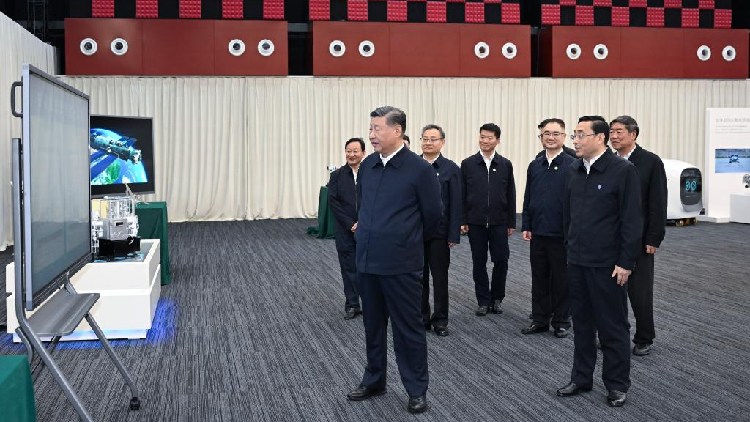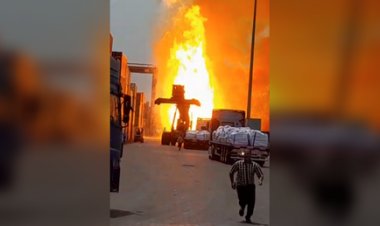Xi Urges Anhui to Forge Its Unique Path in the Narrative of Chinese Modernization
Chinese President Xi Jinping emphasized the importance of Anhui utilizing various national development strategies to further its ambitions of becoming a significant hub for sci-tech innovation, a center for emerging industries, a new frontier for reform and opening up, and a comprehensive zone for green transformation aimed at economic and social development.

Xi stressed that Anhui must fully adopt the new development philosophy. He urged the province to take advantage of various national development strategies as it works to position itself as a key hub for scientific and technological innovation, a center for emerging industries, a leader in reform and opening up, and a comprehensive zone for green transformation in both economic and social realms.
He encouraged Anhui to achieve further progress in integrating into the new development pattern, fostering high-quality development, and creating a "beautiful Anhui" that contributes to the broader narrative of Chinese modernization.
From October 17 to 18, Xi, accompanied by Liang Yanshun, secretary of the CPC Anhui Provincial Committee, and Governor Wang Qingxian, embarked on fact-finding missions in the cities of Anqing and Hefei. His itinerary included visits to various sites, such as a historical and cultural block and a sci-tech park.
The president's first stop on October 17 was Tongcheng City in Anqing, where he explored Liuchi Alley. The alley is named after a historical dispute resolution involving Zhang Ying, a senior official from the Qing Dynasty, and the Wu family, who adjusted their property boundaries to maintain neighborly harmony.
In the alley, Xi learned about the site's history and its cultural significance, examined artifacts from the "Tongcheng School," and discussed local efforts to promote traditional Chinese culture and ethical development.
He emphasized the necessity of enhancing the protection of historical and cultural heritage while advocating for the creative transformation and innovative development of cultural practices. He also highlighted the importance of advancing socialist culture, preserving revolutionary traditions, and passing down fine elements of traditional Chinese culture to establish a solid cultural foundation for social governance.
As locals and tourists gathered, Xi interacted with them, emphasizing the importance of resolving disputes through mediation.
He noted that Liuchi Alley represents ancient wisdom in dispute resolution and should serve as an educational location for promoting traditional Chinese culture, encouraging the traditional virtues of courtesy and humility to foster a harmonious societal environment.
Later, Xi visited Hefei Binhu Science City, where he reviewed significant technological innovations in the province. He was briefed on efforts to innovate systems for scientific and technological development and engaged in discussions with researchers and corporate leaders.
Xi examined high-tech products in sectors including intelligent connected vehicles, next-generation information technology, new energy, artificial intelligence, and health and life sciences.
He carefully observed each product and expressed appreciation for their advancements. He stated that science and technology should lead the charge in propelling Chinese modernization and that sci-tech innovation is crucial to this process.
High-tech, according to Xi, cannot be simply acquired. He called for accelerated efforts toward self-reliance and strength in science and technology.
Recognizing that scientists and researchers are essential to advancing Chinese modernization, he urged them to seize opportunities, unleash their innovative potential, and contribute their talents to strengthen the country’s capabilities in science and technology.
On the morning of October 18, Xi reviewed work reports from the CPC Anhui Provincial Committee and the provincial government. He commended the province's accomplishments while outlining clear objectives for future efforts.
He underscored the need to expedite technological innovation and the transformation of industries. He called for the establishment of national laboratories and a comprehensive national science center in Hefei to effectively use high-level scientific platforms.
Xi urged greater advancements in key generic technologies, cutting-edge technologies, modern engineering technologies, and disruptive technologies. He also stressed expanding international sci-tech exchanges and fostering original innovation capabilities.
He highlighted the importance of creating supportive systems and mechanisms for innovation across various fields, promoting coordinated reforms in education, science, technology, and talent development, and optimizing financial policies that support sci-tech innovation.
Anhui should bolster the foundation of its real economy by transforming and upgrading traditional industries, strengthening emerging strategic sectors, planning for future industries, and developing competitive advanced manufacturing clusters.
Xi also called for coordinated promotions of carbon reduction, pollution control, afforestation, and economic growth, while systematically advancing ecological conservation and governance to enhance disaster management capabilities.
Furthermore, Xi highlighted the significance of extending reform and high-level openness, emphasizing innovative and differentiated reforms to position inland areas as new centers for reform and openness.
He instructed that the public and non-public sectors should both receive dedicated support, ensuring the vitality of all business entities.
The president called for a comprehensive expansion of opening up both domestically and internationally, establishing interconnections between land and sea, as well as between domestic and global markets, and fostering collaboration between eastern and western regions.
Xi advised Anhui to spearhead integrated development plans for the Yangtze River Delta, leveraging this to drive coordinated regional growth in the province. He emphasized the need for active participation in high-quality cooperation under the Belt and Road Initiative and urged reforms to better integrate domestic and international trade while boosting foreign investment and its sustainability.
He insisted on the necessity of developing a new paradigm for integrated urban-rural development, focusing on building modern grain production systems while ensuring a stable food supply and extending trials for rural land contracts.
Xi called for comprehensive support for agriculture, promoting special and green products, improving the agricultural sector’s overall performance, and enhancing rural collective economies. Also, he urged improvements in living conditions in rural areas to foster beautiful villages.
He advocated for boosted urbanization initiatives concentrating on county seats while enhancing policies for employment and social assistance, aiming to prevent large-scale regressions into poverty.
Xi pointed out the need for community-level governance improvements through Party building, applying the "Fengqiao model" as a guiding principle.
He stressed the importance of integrating culture and tourism, promoting integrated tourism, and transforming cultural tourism into a pillar industry. He called for efforts to uncover and utilize the educational and tourism potential of revolutionary cultural resources, as well as the preservation of traditional villages and architecture.
Xi promoted public engagement in cultural and ethical development initiatives while encouraging the transformation of outdated customs under socialist values and called for reforms in the cultural sector to produce high-quality cultural products.
He reiterated the importance of upholding Party leadership and enhancing Party building, including regular disciplinary education to instill discipline among Party members and officials.
Xi emphasized the necessity of addressing issues related to official misconduct and inefficiency, alongside optimizing systems to prevent unnecessary bureaucracy.
He reiterated the commitment to fighting against corruption to improve the political climate.
Finally, he stressed the importance of effectively executing economic tasks in the fourth quarter, aligning with the CPC Central Committee's policies to achieve the economic and social development objectives set for the year.
Alejandro Jose Martinez for TROIB News
Discover more Science and Technology news updates in TROIB Sci-Tech












